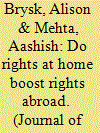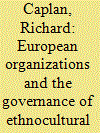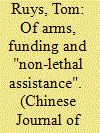|
|
|
Sort Order |
|
|
|
Items / Page
|
|
|
|
|
|
|
| Srl | Item |
| 1 |
ID:
128859


|
|
|
|
|
| Publication |
2014.
|
| Summary/Abstract |
Does women's empowerment strengthen global good citizenship? We test theories of democratic foreign policy and feminist international relations that suggest that more deeply democratic countries with greater gender equity will be stronger international human rights promoters. First, the direct empowerment of women as policymakers and civil society constituencies may shift states' incentives and ability to pursue international human rights initiatives. Second, greater sexual equality may lead to feminist socialization of the wider society to promote human rights values. We test these predictions by measuring the relationship between five different measures of sexual equality and a country's propensity to support 30 international human rights outcomes, including legal commitments, humanitarian assistance, and sanctions, controlling for previously established contributing factors such as level of development and democratic regime type. We find that more sexually equal countries are more likely to support international commitments to constrain state violence against individuals, international measures to combat gender and sexual orientation discrimination, and more and higher quality development assistance. However, sexual equality appears to yield less benefit for more costly human rights initiatives: yielding sovereignty to international legal institutions, promoting economic rights through concessionary trade policies, or adopting diplomatic sanctions against pariah states. These effects are stronger in democratic states, where citizen empowerment translates more readily into foreign policy, and are also found in a sample that excludes the Western powers.
|
|
|
|
|
|
|
|
|
|
|
|
|
|
|
|
| 2 |
ID:
133959


|
|
|
|
|
| Publication |
2014.
|
| Summary/Abstract |
The post-Cold War period to date has witnessed renewed international and especially European preoccupation with issues pertaining to ethnocultural diversity and the challenges for governance arising from these issues. This article discusses the shift that has occurred in support of national minority rights in Europe and why European organizations have become more concerned with these rights after the Cold War. It examines some of the major policy initiatives adopted by European organizations in response to the nearly 25-year long Yugoslav crisis and what these initiatives reveal about new (and old) thinking within these organizations with respect to national minority rights and the management of ethnocultural diversity more generally. It also discusses the consequences of these initiatives for minority rights protection and some of their broader implications for European policy in the future.
|
|
|
|
|
|
|
|
|
|
|
|
|
|
|
|
| 3 |
ID:
134205


|
|
|
|
|
| Publication |
2014.
|
| Summary/Abstract |
In spite of legal objections, the European Union (EU) in May 2013 gave the conditional green light for the transfer of arms to the Syrian Opposition Council. The EU's decision is not a solitary move. Several other States, including Russia, the United States, Qatar and Saudi Arabia, have provided arms, funding and/or "non-lethal assistance" either to the Syrian government or to rebel forces combatting the Assad regime. The present contribution aims to shed light on the legality of such assistance. On the one hand, it assesses legal objections related to the fact that third-State assistance is used for the commission of widespread war crimes and human rights violations. On the other hand, it examines the compatibility of such assistance with the non-intervention principle and, in so doing, examines to what extent the latter principle discriminates between de jure governments and non-State armed groups in the context of a civil war.
|
|
|
|
|
|
|
|
|
|
|
|
|
|
|
|
| 4 |
ID:
133974


|
|
|
|
|
| Publication |
2014.
|
| Summary/Abstract |
This article explores the conceptual relationship between trafficking in human beings, enslavement and crimes against humanity. The analysis of case law of the International Criminal Tribunal for the Former Yugoslavia and the European Court on Human Rights reveals that, while trafficking in human beings and enslavement are increasingly overlapping, they still do not coincide. Moreover, enslavement is only a crime against humanity if it is committed in a widespread or systematic manner by an organization which displays State-like features. In the opinion of the author, the qualification of human trafficking as "modern slavery" is therefore confusing. The fact that human trafficking covers a wide array of offences influences the choice of forum in respect of criminal law enforcement. While enslavement as a crime against humanity may belong to the jurisdictional realm of international criminal tribunals and the International Criminal Court (provided that domestic jurisdictions have proved to be "unwilling" or "unable"), other forms of human trafficking are, in the view of the author, best left to national courts.
|
|
|
|
|
|
|
|
|
|
|
|
|
|
|
|
| 5 |
ID:
131694


|
|
|
|
|
| Publication |
2014.
|
| Summary/Abstract |
'Naming and shaming' those accused of abuse and misconduct is one of the most common strategies of transnational activists. Yet both qualitative and quantitative studies show that the policy and behavioural effects of naming and shaming are often contradictory. Named and shamed actors do respond at least partially by adjusting their policies and behaviour to some extent, but the actions challenged publicly as human rights violations may not cease and can even become more widespread. This ambivalent outcome is usually explained by the uneven capacity of the target to reform or by its 'strategic' response to escape the consequences of naming and shaming. By contrast, I show that naming and shaming can be brought to a standstill when the frame used by transnational activists is ambiguous. I trace the role of framing ambiguity during the Human Rights Watch (HRW) 'naming and shaming' campaigns against the Israel Defence Force (IDF) in the course of the July-August 2006 Israel-Hezbollah war (Lebanon war), and the December 2008-January 2009 Israel-Hamas war (Gaza war). I argue that HRW's use of International Humanitarian Law (IHL) as a frame led to an argumentative deadlock (frame implication contest). This legal frame, and the process of legal framing, did genuinely constrain the IDF, affecting its operations and behaviour. However, the ambiguity of the frame also provided the IDF with a range of material and ideational assets that gave it scope to claim that its actions were actually in conformity with applicable law, and to justify continuing to use force in densely populated areas.
|
|
|
|
|
|
|
|
|
|
|
|
|
|
|
|
|
|
|
|
|